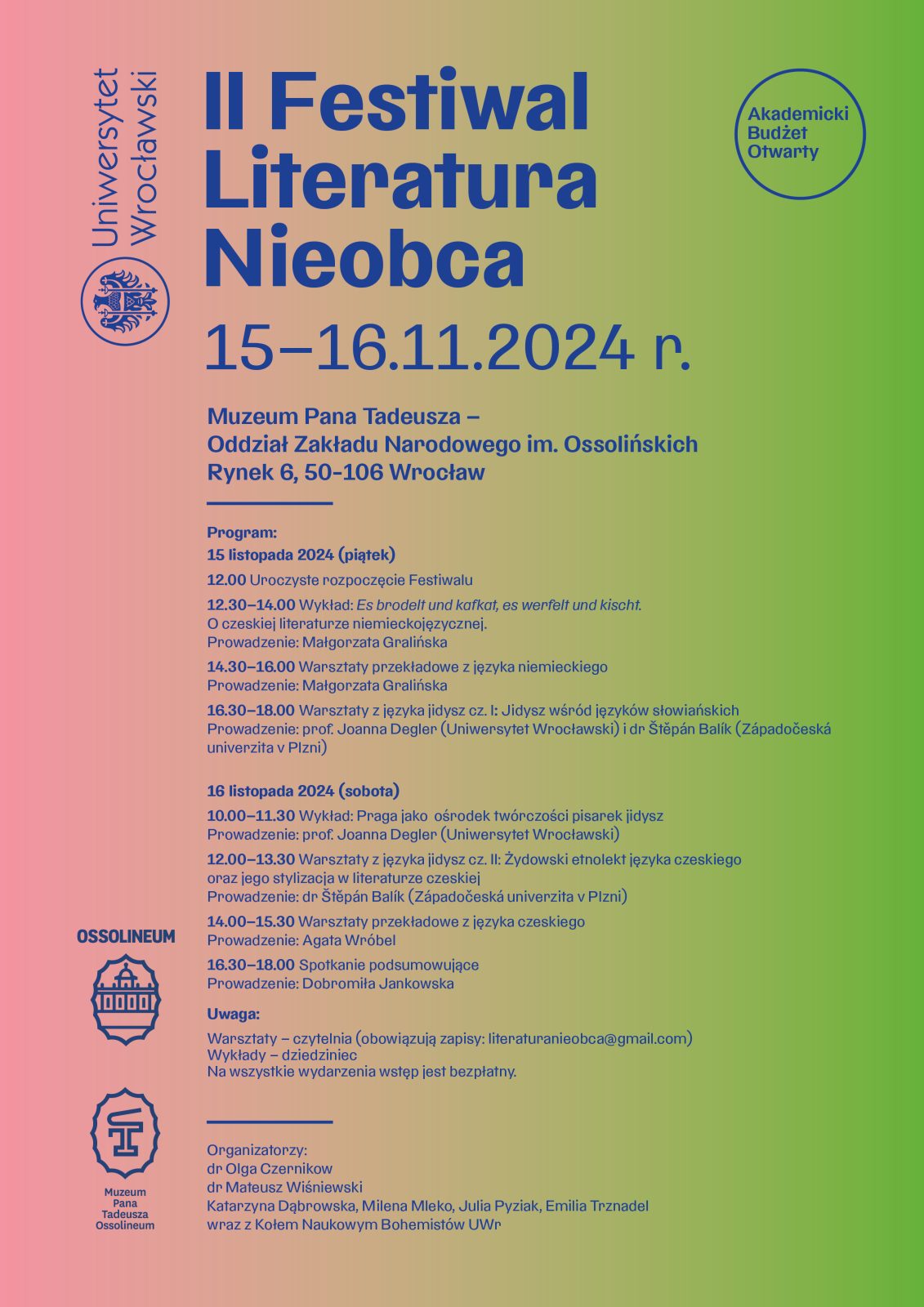
Festival of Non-Foreign Literature: 2nd Edition
Department of Czech Studies of the UWr Institute of Slavic Studies invites you to the Festival of Non-Foreign Literature, 2nd edition, which will be held on 15-16 November 2024 in Wrocław. This year’s edition of the Festival will focus on Czech, German, and Yiddish literatures.
Participants will look at the relationship between the three literatures and the three languages, trace how they influence one another, and look for connections between the three different cultures. The Festival will be held in the center of Wrocław, in the hospitable interiors of the Pan Tadeusz Museum. However, the participants’ thoughts will surely wander more than once to Prague, a city where the three above-mentioned cultures have spent years laboriously intertwining, thus forming a complex, fascinating knot. Some of these tangled threads will undoubtedly lead the students to Franz Kafka (we are celebrating the year-round Kafka 2024 festival, after all!), others to Kafka’s peers and contemporaries who wrote in Yiddish, and still others to contemporary authors who have chosen to write in a language which is not their own (or perhaps we should say it is a language they adopted).
The festival program offers lectures, workshops, discussions, and meetings with translators and researchers. Admission to all events is free (registration is required for the workshops).
The guests of the festival are dr Štěpán Balík, prof. Joanna Degler, Małgorzata Gralińska and Agata Wróbel. They will be supported by the initiator of the event, Olga Czernikow, as well as by Dobromiła Jankowska, the good spirit of the Festival.
Those who want to take part in the translation workshops (Czech to Polish and German to Polish) and/or the language workshops (Yiddish) must apply by e-mail: literaturanieobca@gmail.com. Number of participants is limited; participation will be decided by the order of applications.
During the Czech and German translation workshops the participants will work on texts chosen by the hosts. We advise and encourage the participants to translate the texts themselves before the workshops. The texts can be found below.
For more information and news see the Festival’s Facebook event.
Festival program:
15 November 2024 (Friday)
12:00 Official opening of the Festival
12:30 – 14:00 Lecture: „Es brodelt und kafkat, es werfelt und kischt. O czeskiej literaturze niemieckojęzycznej” (“Es brodelt und kafkat, es werfelt und kischt. On German-language Czech literature”)
Host: Małgorzata Gralińska
14:30 – 16:00 German to Polish translation workshop
Host: Małgorzata Gralińska
16:30 – 18:00 Yiddish language workshop part 1: Yiddish among Slavic languages
Hosts: prof. Joanna Degler (University of Wrocław) and dr Štěpán Balík (University of West Bohemia)
16 November (Saturday)
10:00 – 11:30 Lecture: „Praga jako ośrodek twórczości pisarek jidysz” (“Prague as the creative center of female Yiddish writers”)
Host: prof. Joanna Degler (University of Wrocław)
12:00 – 13:30 Yiddish language workshop part 2: Jewish ethnolect of Czech and how it is depicted in Czech literature
Host: dr Štěpán Balík (University of West Bohemia)
14:00 – 15:30 Czech to Polish translation workshop
Host: Agata Wróbel
16:30 – 18:00 Meeting summarizing the event
Host: Dobromiła Jankowska
Please note:
The workshops will take place in the reading room of the library (registration is required).
The lectures will take place in the courtyard.
Admission to all events is free.
Organizers:
dr Olga Czernikow
dr Mateusz Wiśniewski
Katarzyna Dąbrowska
Milena Mleko
Julia Pyziak
Emilia Trznadel
and the Student Scientific Association of Bohemians
Translated by Monika Klimiuk (student of English Studies at the University of Wrocław) as part of the translation practice.




